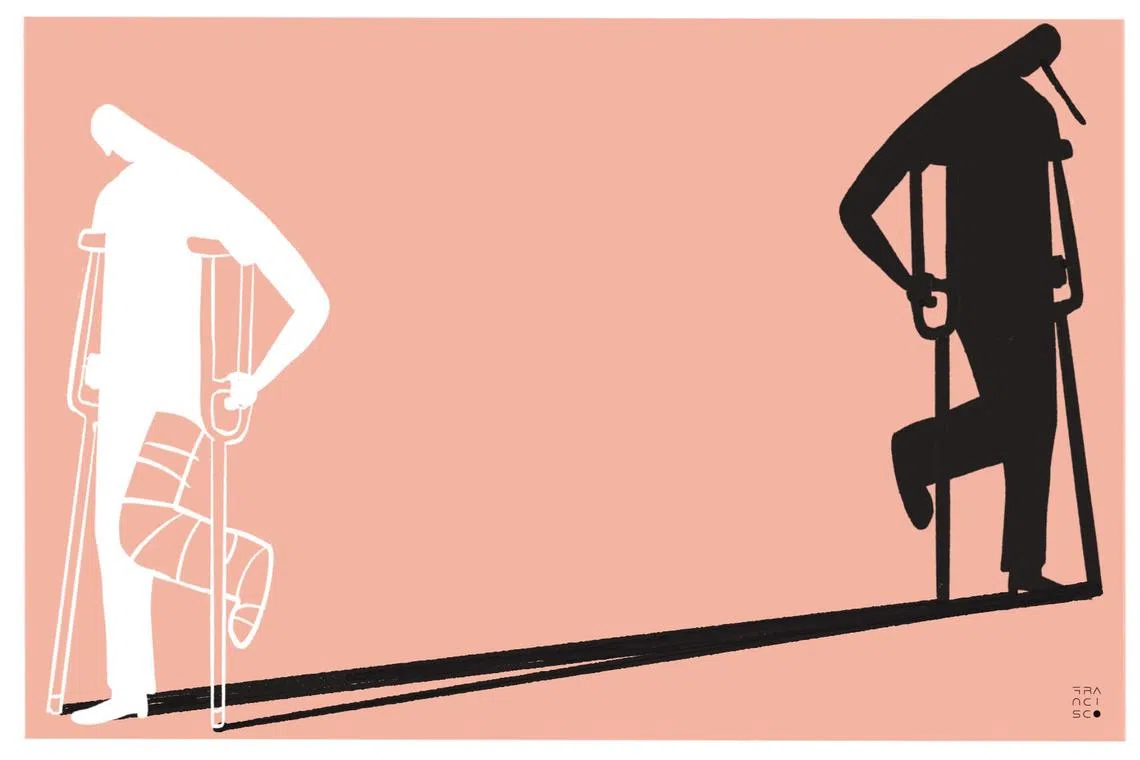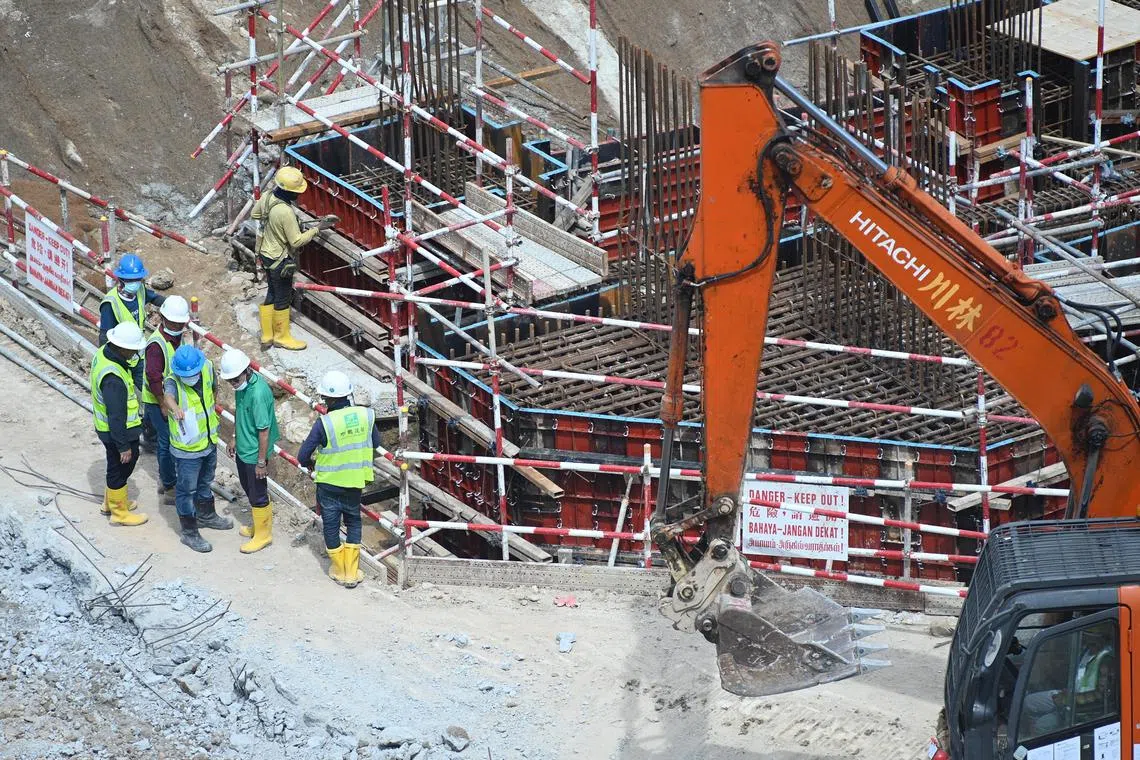Accidents for payouts: How common are workplace injury scams?
Sign up now: Get ST's newsletters delivered to your inbox

According to data from the Ministry of Manpower, about 28,500 claims are filed each year under the Work Injury Compensation Act.
ST ILLUSTRATION: MANNY FRANCISCO
- Singapore sees about 28,500 annual work injury claims under Wica, with a small percentage suspected as fraudulent, leading to investigations and prosecutions.
- Employers and insurers report instances of staged accidents and injury exaggerations, prompting calls for stricter Wica rules and better employee education.
- NGOs highlight issues faced by workers, including delayed claim processing, inadequate medical care, and employers avoiding incident reporting to MOM.
AI generated
SINGAPORE – Tens of thousands of workers in Singapore file compensation claims for injuries sustained on the job. While the vast majority are genuine, a small number of fraudulent claims still slip through the cracks.
According to data from the Ministry of Manpower (MOM), about 28,500 claims are filed each year under the Work Injury Compensation Act (Wica) – designed to protect both workers and employers by making the claim process cheaper and quicker than court action.
Around 12 Wica claims are flagged for investigation each year. Over the last five years, around two workers were prosecuted for false claims each year.
Several employers, insurers and private investigators told The Straits Times that they have dealt with such fraud.
A construction boss, who asked to be identified as Mr Salman, said one of his workers sought medical help from multiple hospitals for his Wica claim.
But appointment records showed that the injury happened before he was even hired.
Mr Salman added that a few other workers also appeared to be “causing trouble” deliberately – allegedly getting themselves injured so they could get a Special Pass from MOM, which allowed them to remain in Singapore while their claims were pending.
Although they were not allowed to work during this period, some were found taking on illegal freelance gigs that paid more than their regular jobs, he said.
Insurers like MSIG and Etiqa told ST they have seen workplace injury claims involving staged accidents, exaggerated injuries, and misrepresentation of unrelated injuries that occurred outside of work.
MSIG said such cases make up less than 10 per cent of the claims it handles, without disclosing the exact number. Similarly, Etiqa declined to share the number, but said it carries out rigorous checks to guard against abuses, including inspecting accident sites, consulting doctors and appointing independent investigators.
Private investigators also reported ongoing demand from employers who need help to verify suspicious claims.

Insurers like MSIG and Etiqa told The Straits Times that they have seen workplace injury claims involving staged accidents, exaggerated injuries, and misrepresentation of unrelated injuries that occurred outside of work.
ST PHOTO: DESMOND WEE
Mr Muhammad Najib, a partner at Resilient Investigations, said there is more demand for his service, especially from bosses in physically demanding industries such as the construction sector.
Mr Lim Yong Yi, managing director of Ranger Investigation and Security Services, said his agency handles five to 10 cases yearly.
“We have collected video evidence of employees who appeared physically impaired in front of their employer and co-workers, but were able to behave or perform normally once their employer and co-workers were out of sight,” he said.
There were also cases where the injured workers had fully recovered but claimed otherwise, so they could earn a second income while on medical leave, he said.
How Wica works
Under Wica, employers are required to buy work injury compensation insurance for all manual workers, as well as non-manual workers earning $2,600 or less a month.
Workers who are injured in the course of their work are entitled to compensation – even if the injury is due to their own carelessness. But exceptions apply in cases involving drugs and alcohol, fights, or deliberate self-harm.
In the first year of an open claim, employers have to foot the workers’ medical bills – capped at $45,000 – and pay their wages when they are on medical leave, before getting reimbursed by the insurers.
If a doctor determines that an injury has resulted in the worker’s death, permanent incapacity, or incapacity that lasts beyond six months, the insurer will pay a lump sum based on the workers’ age, salary and severity of injury.
If there are disputes over the sum, workers can refer their cases to MOM for a final review.
Alternatively, they can drop the Wica claim to pursue a civil lawsuit instead. Non-governmental organisations (NGOs) like Migrant Workers’ Centre (MWC) and Transient Workers Count Too (TWC2) told ST that they encourage workers to adopt the Wica process.
The Humanitarian Organisation for Migration Economics (Home) said it has referred cases to lawyers when workers suffered major injuries that left them unable to return to their previous jobs in the construction or marine sectors. They have also done so for cases with “substantial evidence” suggesting employers’ negligence.
Is suing worthwhile?
Pursuing civil lawsuits, however, can potentially be a “very risky move” for employees, said Mr Khelvin Xu, a director at law firm Covenant Chambers who has handled injury claims.
“While employees do not need to prove fault (on the employers’ part) for a Wica claim, they need to do so for a common law claim,” he said.
In one case, a worker’s negligence suit against his employer and the latter’s counter-claim became a drawn-out court battle.
The incident took place in June 2020 at a manufacturing company of fire suppression systems.
A foreign worker had slipped off a ladder loosely propped against a wall while installing a CCTV camera alone – without his safety shoes, according to court documents. His fall was captured on another CCTV across the wall, and he was treated for his fractured toe in the following days.
In July, a law firm representing the worker filed an incident report to MOM, before his employer followed suit a few days later.
In August, the law firm informed the employer that the worker would drop his Wica claim and instead sue for damages, on the grounds that he had been instructed to install the CCTV using a defective ladder.
His employer countered that the worker, who was never asked to install that camera in the first place, had staged the accident – allegedly under a co-worker’s instigation.
After 12 days of hearings stretching from 2021 to 2023, a State Courts judge in 2024 dismissed both the worker’s claim that the employer was negligent and the employer’s counter-claim that the injury was staged, citing insufficient evidence.
Dissatisfied with the State Courts’ decision, the worker appealed to the High Court but the appeal was dismissed in May 2024.
The employer in this case told ST that the lawsuit, as well as the medical fees and wages paid to the worker during his medical leave, had cost close to a six-figure sum.
Three sources told ST that a small group of agents claiming to be representatives of law firms or lawyers has approached migrant workers at their dormitories or other common haunts, persuading them to sue their employers for bigger payouts in exchange for a share of the compensation.
The Law Society of Singapore said it is unable to reveal if it has received complaints about such behaviours, citing confidentiality reasons. But it urged members of the public to lodge a complaint if they have concerns about a lawyer’s conduct.
Its spokesperson added that lawyers must avoid conflict of interest as they are banned from entering into contingency fee arrangements that give them a financial stake in the outcome of a case.
More safeguards needed
Employers are generally encouraged to install CCTVs that cover as many workplace areas as possible, said Mr Ian Lim, a partner and head of employment law at TSMP Law Corporation. The presence of cameras acts as a deterrent against staged accidents, while the footage helps employers address all cases – whether genuine or not.
CCTV footage proved to be a valuable safeguard against fraudulent claims for an employer in 2019.
A worker at Enlighten Furniture had claimed that he injured himself after falling backwards down a flight of stairs while tasked to carry a wooden box. But CCTV footage showed he had rehearsed his fall before the supposed accident.
The worker was convicted and jailed in 2021.
Integrating artificial intelligence (AI) into video surveillance systems can offer even more safeguards, noted Mr Kenneth Siew, chairman of the Singapore Contractors Association’s workplace safety and health committee.
He said such AI-powered systems have been used at construction sites lately to alert employers when workers fail to follow safety rules, such as not wearing a helmet or vest.
When workers know they can be flagged for such lapses, “they are less likely to take chances”, he said.
The two business owners who spoke to ST also urged MOM to tighten existing Wica rules. They said workers should stick to either a Wica claim or civil suit, rather than allowing them to change course after their bosses have paid their medical bills and leave wages.
Another crucial step is employee education.
Mr Lim from TSMP Law said workers should be made aware of the serious consequences of making false claims from the outset.
To help employers on this front, ArcLab Singapore, a mobile training platform used by companies in sectors such as construction and logistics, recently introduced a module on Wica on its website, said the company’s co-founder James Chia.
Workers’ woes
While employers grapple with many challenges, NGOs said workers also face issues during the claim process.
The Home spokesperson said there is a lack of enforcement for employers to pay medical leave wages while their workers’ Wica claims are being processed.
The advocacy group also urged MOM to determine the validity of the claims at the start, rather than leaving it to insurers who may have a vested interest in limiting payouts.
Mr Ethan Guo, TWC2’s executive director, flagged that insurers, their brokers and loss adjusters sometimes take too long to process Wica claims. Some employers are slow to respond to requests for documentation, so it is not uncommon for workers to wait for a year or longer.
According to MOM, the median time taken to process a claim is about six months, with about 96 per cent of the claims resolved within a year.

Mr Guo said some employers have also taken their workers to company clinics where medical certificates are not issued, so they can avoid reporting the incidents to MOM.
“This point cannot be stressed enough: When workers get injured at work, they truly are at the mercy of their employers,” he told ST.
The MWC, which handled 602 work injury and medical assistance cases in 2024, also cautioned against painting all migrant workers with the same brush.
Mr Michael Lim, MWC’s executive director, said: “What we do observe are cases where workers are denied timely or adequate medical care, or are prematurely discharged by employers with the intent of repatriation.”
While MWC strongly advised workers to adopt Wica, those facing difficulties with their claims, or whose injuries are not covered under Wica, can approach the Migrant Workers’ Law Centre.
Lawyers from Pro Bono SG will be assigned to provide help in such cases, he said, so they can avoid costly lawsuits.


